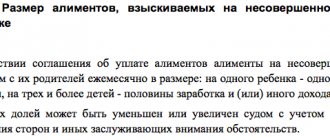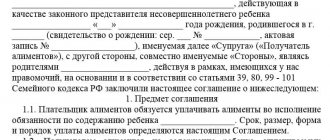Home / Alimony / How to apply for alimony for an adult son or daughter?
Too many of our nation's elderly and disabled people are on the brink of survival. Pensions and social benefits are too small to provide for the basic needs of people, not to mention the need for rest, treatment, and restoration of health.
But the saddest thing is not that the state does not help people in need, but that the closest people - sons and daughters - do not help their needy parents. And too few parents dare to demand financial assistance from adult, well-to-do children. Especially through the court. In vain! After all, the law is on the side of disabled and low-income people deprived of their means of subsistence.
In this article we will look at the procedure for applying for child support for adult children.
Is it possible to apply for child support for my son or daughter?
According to the Constitution and the Family Code of the Russian Federation, not only minor children from their parents have the right to care and assistance, but also disabled, needy parents from adult children (clause 1 of article 87 of the RF IC, as well as clause 3 of article 38 Constitution of the Russian Federation).
Parental support is a sum of money that is voluntarily or compulsorily collected from an adult son or daughter in favor of the parents to ensure the latter’s basic life needs.
How can I apply for alimony?
The law provides two ways to apply for child support for a son or daughter:
- Voluntary agreement between parents and adult children.
- Collection of alimony through the court.
The first method - concluding a voluntary agreement - is suitable for those families who are able to agree on the procedure, terms, amounts of alimony payments and formalize the agreement in the form of a written, notarized document.
Expert opinion
Semyon Frolov
Lawyer. 7 years of experience. Specialization: family, inheritance, housing law.
The advantages of this method are undeniable:
- short time;
- voluntariness;
- reaching a compromise;
- absence of material costs for the judicial procedure;
- ease of paperwork.
If one of the parties fails to comply with the terms of the voluntary agreement, the second party can use the agreement for enforcement - as a writ of execution in the bailiff service.
In the event that a son or daughter categorically refuses to provide parents with financial assistance and enter into an alimony agreement, there is nothing else left but to go to court (Clause 2 of Article 87 of the RF IC).
You can go to court only by way of claim proceedings - by filing a statement of claim for the recovery of alimony for the mother/father. It is impossible to submit an application for a court order - alimony for parents is paid only in a fixed amount of money, which the court must determine at a court hearing when considering all the circumstances of the case (clause 3 of Article 87 of the RF IC).
Execution of a court decision
After the court decision is made, the father or mother is given a writ of execution. With him, the father or mother goes to the bailiffs, who collect funds in favor of one of the parents.
After such a decision is made, children cannot refuse the assigned obligations until circumstances change. In the event, for example, that a son or daughter is fired, the court may cancel child support for the parents.
The court may also order the collection of alimony funds from children for a period of 3 years. A period of 3 years is assigned if one of the children flatly refuses to fulfill their duties, and this is proven in court.
If there are special conditions (high wages for children, sincere repentance of the father or mother), the court orders a 3-year payment of similar alimony payments by the adult children.
Conditions for filing a lawsuit for alimony
Of course, every parent has the right to expect love, care, and all possible help from their children. But not every parent who needs additional money can legally demand child support from an adult son or daughter.
The law provides conditions under which you can sue for alimony. This:
- Incapacity of a parent (disability confirmed by MSEC or retirement age: for the first half of 2020 - 55.5 years for women and 60.5 years for men);
- The neediness of the parent (the degree of neediness is determined on the basis of the subsistence level - if the parent’s income is below the amount established by law, he needs financial assistance from adult children);
- Parental rights (the parent must not be deprived of parental rights or must have their rights restored);
- Fulfillment of the responsibility for the upbringing and maintenance by a parent of a son or daughter until adulthood;
- The age of majority and ability to work of a son or daughter;
- Lack of alimony agreement.
How does the court determine the amount of payments?
When establishing the amount of child support for an elderly parent, the court takes into account a set of factors, including:
- the income of the parent and his adult son (daughter);
- the level of the plaintiff’s real needs (how much money is needed to buy medicines, food, pay for a nurse’s services, etc.);
- marital status of the adult child, the number of his own children.
The court sets alimony as a percentage of the defendant's income or as a fixed amount. The second option is used if the child receives income in foreign currency, his earnings are unstable (for example, due to the seasonal nature of the business).
The legislation does not contain clear rules regarding how the court acts if the applicant has several children . In practice, most often, alimony obligations are distributed equally between them.
You may also be interested in the article: Child support for parents
The procedure for collecting alimony from adult children
A claim for alimony from an adult son or daughter can only be made if the appropriate decision is made by the court in a lawsuit. Therefore, the first step is to file a claim in court.
The statement of claim must contain the following information:
- The name of the court in which the claim is filed;
- Information about the plaintiff - full name, date of birth, place of residence, marital status, contact information;
- Information about the defendant - full name, date of birth, place of residence, place of work, marital status, contact information;
- The title of the document is “Statement of Claim for Collection of Alimony”;
- Description of the circumstances - the status of the parent (retired or disabled), the need of the parent (calculation of income and expenses), information about the lack of assistance from an adult and able-bodied son or daughter;
- Information about the absence of a concluded alimony agreement;
- Legality of the plaintiff’s claims (link to legislative acts);
- Calculation of the amount of child support necessary to meet the basic needs of the parent;
- The claim is to recover from the adult child the specified amount of child support in favor of the parent;
- List of attached documents;
- Plaintiff's signature;
- Date of filing the claim.
Documentation
The following documents must be attached to the statement of claim:
- Plaintiff's passport;
- The defendant's birth certificate;
- Pensioner's ID;
- Statement of disability from MSEC;
- Certificate of the amount of accrued pension or disability benefit;
- Employment history;
- Calculation of income and expenses;
- A copy of the defendant's notice of the upcoming case;
- A copy of the statement of claim for the court.
Where and how to file a claim for alimony
The completed statement of claim should be submitted to the magistrate’s court at the place of residence of the plaintiff or defendant.
The plaintiff can file a claim and the documents attached to it either personally or through a representative by proxy. In addition, it is possible to send by mail - a valuable letter with notification and an inventory of the contents. You must first send a notice of claim to the defendant - son or daughter.
Plaintiffs are exempt from paying the state fee for filing a claim for alimony (clause 2, clause 1, article 333.36 of the Tax Code of the Russian Federation). Costs shall be borne by the defendant. For example, if the court satisfies the demands of the claim and assigns alimony for the maintenance of the parents.
Rubric “Question/Answer”
Good afternoon, if a voluntary agreement has been concluded, where should it be taken - to the bailiffs or to the defendant’s place of work?
Expert opinion
Semyon Frolov
Lawyer. 7 years of experience. Specialization: family, inheritance, housing law.
The alimony agreement can be submitted either to the bailiffs or to the payer’s accounting department at his place of work. It all depends on your preferences. If you don’t want to go to the accounting department, give it to the bailiffs. The address of their Service can be found on the official website https://fssprus.ru. Choose a branch that serves the place of residence of the alimony payer . For example, if he lives in Tula, and you are in Voronezh, contact the Tula SSP. There you need to send not only an agreement with your son/daughter, but also an application to initiate enforcement proceedings. It doesn’t have to be in person - you can send it by registered mail or through a representative (by proxy). The bailiffs will initiate an IP and themselves transfer the agreement to the defendant’s place of work.
Can I apply for child support for my adult daughter if she has three children and is on maternity leave?
Expert opinion
Dmitry Nosikov
Lawyer. Specialization: family and housing law.
Yes you can. But going to court does not guarantee that the decision will be in your favor. Being on maternity leave and having a large family are valid reasons for exemption from alimony for the maintenance of disabled parents. The court takes these circumstances into account. At the same time, you will have to prove the fact of need, disability and high expenses. The situation is not simple. Most likely, the court will refuse the request to collect alimony from a mother with many children. At the same time, if you have other adult children, you can also collect alimony from them for your maintenance. According to paragraph 4 of Art. 87 of the RF IC, the court determines the amount of payments from all able-bodied children. In other words, if in addition to your daughter you have an adult working son, alimony will probably be withheld from his earnings.
My father is threatening my husband that he will sue him for child support. Previously, this father was deprived of parental rights in relation to his son (for failure to pay child support). Will he be able to demand alimony from my husband for his maintenance? What are we risking if we have a child together?
Expert opinion
Semyon Frolov
Lawyer. 7 years of experience. Specialization: family, inheritance, housing law.
If the father was deprived of the right to raise his son and has not been restored to parental rights, he has no right to demand alimony from his child (Clause 5 of Article 87 of the RF IC). The law clearly states that this is impossible. Therefore, in your case, your father’s words are just threats. Moreover, they are not supported by anything. Even if he goes to court with a claim to collect alimony from his son, he will be denied. A copy of the court decision depriving the father of parental rights . The magistrate will look into the archive and find out about this circumstance.
I pay child support to my ex-wife. How will the amount of payments change if my mother files for child support against me?
Expert opinion
Dmitry Nosikov
Lawyer. Specialization: family and housing law.
There are no methodological recommendations on this matter. The final amount is set by the participants themselves - by agreement, or they go to court - then the amount of alimony will be determined by the judge. The financial situation of the parties is taken into account, i.e. amount of income/expenses, frequency of payments and other payments. If child support is established as a share of earnings, then for the maintenance of parents - exclusively in hard form - by virtue of clause 3 of Art. 87 RF IC. For example, 25% of the salary for a child, and 3,000 rubles per month for a mother.
At the same time, the amount of deductions cannot exceed 50% of all obligations, and in the case of alimony for minors - up to 70%. I believe that in your case, payments for the child will remain, and in addition to this, the court will assign a fixed amount for the maintenance of the mother. The final amount of alimony will be higher than it is now . Try to conclude a child support agreement with your mother - in this case, there is a chance to discuss financial issues yourself. If the mother files a claim in court, a large amount may be awarded.
Please tell me, I want to apply for alimony for my daughter (born in 1975). But I do not have her birth certificate, a copy of which must be attached to the statement of claim. What should I do?
Expert opinion
Dmitry Nosikov
Lawyer. Specialization: family and housing law.
First of all, contact your daughter and ask her to provide a copy of her birth certificate. If she refuses, you have a second option - go to court with a claim for alimony + a petition to request a certificate from the defendant (daughter). The court itself will require the necessary document from the defendant or make a request to the registry office.
Disabled and needy parents have the right to collect child support from adult, able-bodied children.
Especially if the children do not help their mother and father in any way, but avoid supporting them. Such cases are more often heard in the courts. The parents’ task is to confirm their status, calculate child support, draw up a statement of claim and behave correctly in court. If everything is done correctly, the chances of collecting alimony in a fixed form are high. If you take the wrong approach, you can only waste time and nerves. The court will not side with the plaintiff unless he proves that he really needs maintenance, and the children can pay alimony. What if an adult child is disabled? Does he pay alimony for his wife and children? Officially unemployed or hiding from a parent? Before going to court, it is better to consult a lawyer. You can get all the help you need on our website. Lawyers provide free consultations - online and by phone. Leave a request and a lawyer will contact you. Attention!
- Due to frequent changes in legislation, information sometimes becomes outdated faster than we can update it on the website.
- All cases are very individual and depend on many factors. Basic information does not guarantee a solution to your specific problems.
That's why FREE expert consultants work for you around the clock!
- via the form (below), or via online chat
- Call the hotline:
- Moscow and the Region
- St. Petersburg and region
- FREE for a lawyer!
By submitting data you agree to the Consent to PD Processing, PD Processing Policy and User Agreement.
Anonymously
Information about you will not be disclosed
Fast
Fill out the form and a lawyer will contact you within 5 minutes
Tell your friends
Rate ( 1 ratings, average: 5.00 out of 5)
Author of the article
Irina Garmash
Family law consultant.
Author's rating
Articles written
612
Receiving the money
You can receive child support without going to court if there are no disagreements between the child’s parents regarding the maintenance of their common child. In this case, a child support agreement is concluded, which clearly states the amount and terms of child support payments, the method of monitoring the targeted expenditure of money and, if necessary, the time of communication with the child.
All agreements between parents are stated in writing and certified by a personal signature in the presence of a notary.
It is important to conscientiously fulfill the obligations under the alimony agreement in order to avoid litigation. If you cannot peacefully resolve the problem with alimony, feel free to go to court - Russian legislation is always on the side of the child.










